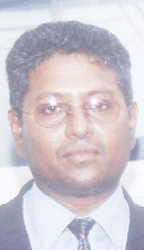-Vic Puran
The lacuna which previously existed in the local extradition laws ought to have been corrected by an amendment of the treaty with the United States, according to attorney-at-law Vic Puran, who said Parliament erred in passing a bill to amend the legislation.

The Fugitive Offenders (Amendment) Bill that was passed in Parliament on Thursday was not necessary, Puran said yesterday when contacted and he questioned how the legislature of a country could unilaterally amend a treaty and impose terms of “legal fiction” which are not there.
According to Puran, the US and the UK had similar issues with their extradition treaties but the subsequent amendments were made. “The problem has occurred before.
We did not need to produce an ingenious solution to it”, the attorney opined. Puran said that his criticism of the Bill is not a criticism of the government, adding that he is merely pointing out a defect.
Puran said the case of King v Director of Prisons which was heavily cited by the Attorney General, Charles Ramson in his presentation on the bill is not a precedent.
He argued that the specific case interprets a treaty saying that the interpretation of a treaty is a question of fact, not a question of law. Puran then questioned if the Court of Appeal were to “today rule that snow fell in the city” as a finding of fact whether a subsequent court will have to find that snow fell. “…the issue is that findings of fact are not judicial precedents”, he added.
Puran insisted that a treaty is an agreement between two countries and that the Parliament ought not to have passed the legislation.
He said what it required is an amendment to the treaty. Prior to his comments yesterday, the attorney had addressed the issue in a letter to the press which was published in the last Sunday Stabroek.
In the letter he wrote that the law officers of the state continue to offer poor advice, noting that in view of Guyana’s relationship with the US, the country has an international obligation to facilitate extradition. However, he said this must be done in a lawful manner.
Further, he wrote that the Parliamentarians are not without advice on the issue since the Full Court led by Chief Justice (ag) Ian Chang delivered a decision on the issue in the Barry Dataram matter.
Puran then called on President Bharrat Jagdeo not to assent to the Bill.
The amendment to the Fugitive Offenders Act 1988 was passed on Thursday last, and it controversially included a provision which empowers the Home Affairs Minister to decide whether to extradite or not.
The AG, who moved the bill, said the amendments represent a suitable formula which was worked out following extensive internal consultations as the administration considered it critical to have some residual discretion lie within the power of the subject minister. “….this government is not trying to give some reason for a man like Dataram to have escaped,” he added while insisting that the amendments have modernized the law.
But AFC member Khemraj Ramjattan fiercely criticized the new modifications calling government’s action an erroneous procedure to correct a treaty which “simply required a section being removed”. He condemned the provision which allows for ministerial discretion and argued that the Minister should not be allowed to “cherry-pick” on an important issue such as extradition. He also contended that it is not likely any high ranking government official if ever accused would be extradited should a request be made.
Further, he noted that his objections to the bill do not “in any way support the Barry Datarams of this world”.
He said the alleged drug trafficker who was released following court rulings should have been extradited a long time ago, adding that the administration didn’t need to wait until some amendment was made.
The Fugitive Offenders (Amendment) Bill 2009, seeks to address a conflict that arose within the law regarding individuals here being extradited, an issue which came into sharp focus back in 2008 when the United States was seeking Dataram for cocaine smuggling offences.
The US was unable to secure Dataram’s provisional arrest because the extradition treaty between Guyana and the US contains a proviso which allows the US to extradite to third countries, clashing with the provisions of the Fugitive Offenders Act, which says “no one shall be extradited or kept in custody for the purpose of extradition from Guyana to another country unless provision has been made by that Common-wealth or treaty- country for ensuring that they would not be extradited to a third country for trial of any offence without the consent of the minister.”
As a result, extraditions to the US have been on hold awaiting a new agreement or an amendment of the law.





